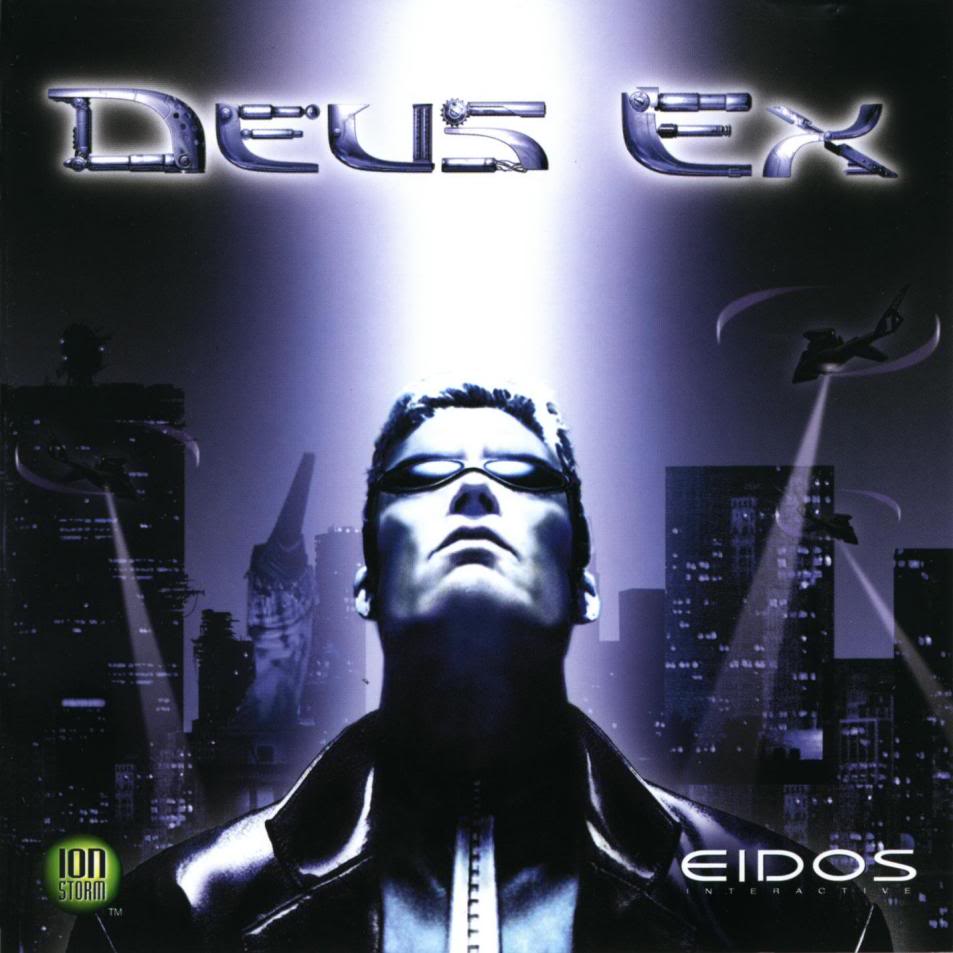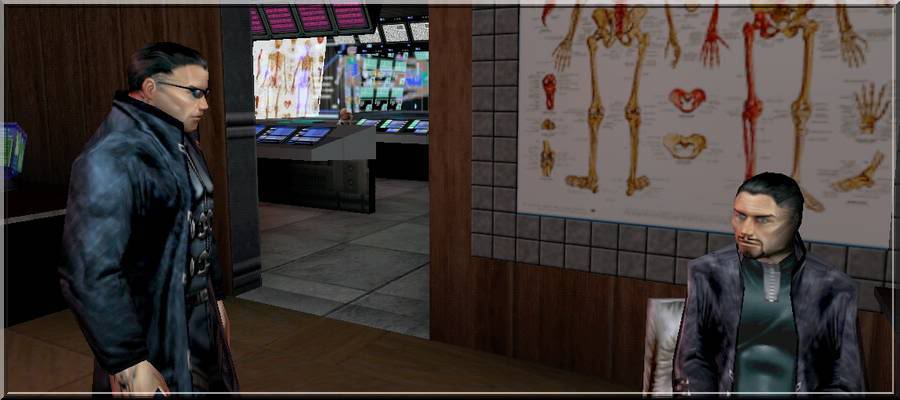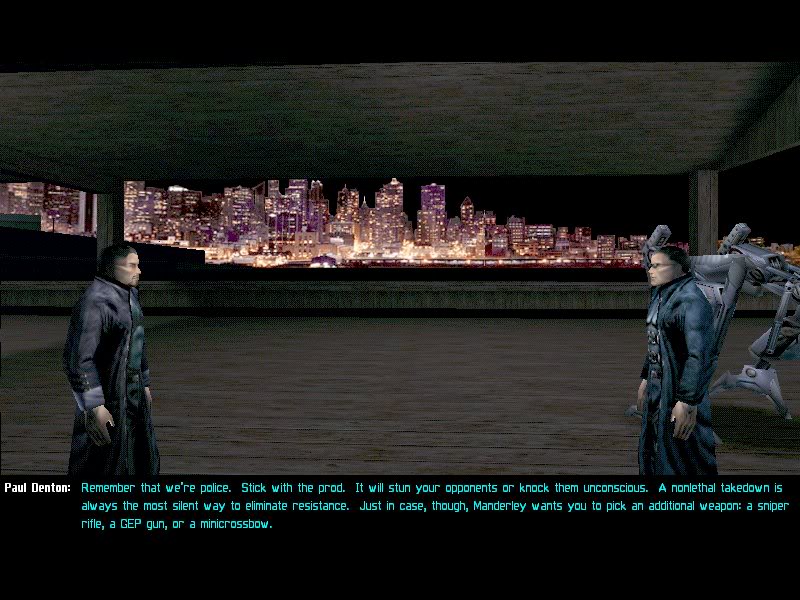This post has not been edited by the GamesBeat staff. Opinions by GamesBeat community writers do not necessarily reflect those of the staff.
Ion Storm's Deus Ex is one of my favorite games of all time. I don't know where it rests, exactly, but it's definitely in my top 3. Deus Ex also celebrated its tenth anniversary on June 22nd, 2010. Before all the resulting tributes and retrospectives, I got to think about why, exactly, Deus Ex is so important to me. Not just why I love it but why it really matters; how my life would be different, if only slightly, without it. I might do more of these, if my other ideas can turn into more articles. But for now, here's Deus Ex Tribute #8576392 of the week.
definitely in my top 3. Deus Ex also celebrated its tenth anniversary on June 22nd, 2010. Before all the resulting tributes and retrospectives, I got to think about why, exactly, Deus Ex is so important to me. Not just why I love it but why it really matters; how my life would be different, if only slightly, without it. I might do more of these, if my other ideas can turn into more articles. But for now, here's Deus Ex Tribute #8576392 of the week.
They killed Paul; they killed my brother.
Somewhere underneath Liberty Island, in a secret underground military complex, I'm standing in a morgue. It doesn't look much different from the rest of the facility; built like a concrete bunker, illuminated by the rectangular, florescent lights built into the walls like windows. Like other areas of the building designated for research or science, the floors are covered in dark blue tiles, tilted and arranged as diamond-shapes rather than the usual squares. In one corner, where the wall meets the ceiling, a spherical security camera spies me, like a tin eyeball. Somewhere in the distance, a security alarm screeches knowledge of my presence to any who can hear it; an unfortunate consequence of the trail of unconscious guards leading from my (former) holding cell to here.
Here, where Paul's body lies dead on a table. They killed my brother. And I let it happen.
Earlier that night, I'm entering Paul's apartment through a window, by way of the fire escape. We barely have time to exchange words when an electronic, monotone voice bellows from outside the front door, demanding we surrender our weapons and step into the hallway.
"Don't be a fool," Paul pleads. "Run!"
I'm back out the fire escape and into the alley. The sounds of shattering wood and gunfire echo behind me. And as I make my escape into the subway, I'm captured anyway. I'm a coward and my brother sacrificed himself for nothing. I'll never again hear his friendly words of advice chime over my InfoLink.
Could I have done things differently?

Somewhere underneath Liberty Island, in a secret underground military complex, I'm standing in a morgue. Somewhere in the distance, a security alarm screeches knowledge of my presence to any who can hear it; an unfortunate consequences of the trail of unconscious guards leading from my (former) holding cell to here.
Here, where Paul lies suffering, but alive, waiting for me.
Earlier that night, I'm entering Paul's apartment through the window. As an electronic, monotone voice calls from opposite the front door, Paul pleads for me to run and save myself. Instead, I run forward, towards the door, planting a mine in the entryway. No sooner do I crouch behind the sofa to take cover, than do I hear the sound of shattering wood as the door crashes to pieces, followed by an explosion as the entering soldiers step on my mine. Paul and I spring to our feet, painting the entrance to his apartment with bullets; Men in Black and marines fall to the ground as they step through the door. The violent shootout continues down into the lobby and out the front door, where we're both captured.
Deus Ex was the first game I played that gave me a choice. The first time, I was ignorant of that choice. Conditioned by years of linear first-person shooters, I assumed the story dictated that I run away and Paul stays to heroically sacrifice himself. But the choice was there: run or fight.
I ran. As a consequence, my brother died and I had to be confronted with his lifeless body and the fact of what I had done. At that point, I made another choice: to not do to others what they had done to me and Paul. That's why the trail of bodies I left as I made my escape were unconscious, either tranquilized or stunned. Paul always advocated the belief that, as members of an international peace-keeping agency, we were police; and as police, we didn't have the right to run and gun, killing without discretion. So onward from the time of his death, I chose to honor that code of personal ethics.
In short: Paul's death affected me. More than that, his death affected how I played the game. I maintained that mentality through my second play. Except, of course, in that moment, back in his apartment. I had no issues killing my enemies then, in that instant, to save his life.

Most games don't give you choices; they give you problems. Granted, these problems can be solved in any number of ways. Sometimes one of those ways is "good" and one is "evil" but the differences between the two are largely binary, with little grey area in between, and the consequences are usually narrative, i.e. different cut-scenes. When your good or evil choices do factor into gameplay, the consequences are minor, i.e. a new weapon or power.
To be fair, your mileage will vary with Deus Ex, as far as the consequences of your actions are concerned. Separating myself from the game, the differences between Paul living or dying aren't drastic. You'll get to see him a live a couple more times and he contacts you over the radio once or twice in the late game, but nothing about the game changes fundamentally. Unless, of course, you make the choice to change a fundamental aspect of the game. What was great about Deus Ex was that it led me to make that next choice (to not kill anyone) and allowed me to see it through.
Deus Ex just did everything. It didn't do everything particularly well but it allowed me to play the game I wanted. It empowered me to make choices, not only in regard to the narrative, but also in regard to my play style. In turn, any choices I made were accepted and rewarded by the game. That experience forever altered the course of the kinds of games that interest me. Extremely polished, balanced, intense Halo? Not really interested. Buggy, broken niche game that blurs genres with brilliant ideas, few of which are executed as well as they should be? Sign me up!
What did Deus Ex do for me?
It changed everything.
Interestingly, it seems to me that game developers in eastern Europe have run with this mentality more than anyone. In CD Projekt's 'The Witcher,' there is no "right" or "wrong," "good" or "bad" to your choices. There are merely actions and consequences that you experience throughout the length of the game. Interestingly, GSC Gameworld's 'S.T.A.L.K.E.R. – The Shadow of Chernobyl' is most often pointed to as the successor to Deus Ex, despite it being much more of an FPS than an RPG. But the world that they gave you, and the freedom to explore it, interacting with various characters and factions, still managed to invoke that undefinable 'Deus Ex' "feeling" better than most games. But I suppose that's a separate post.
